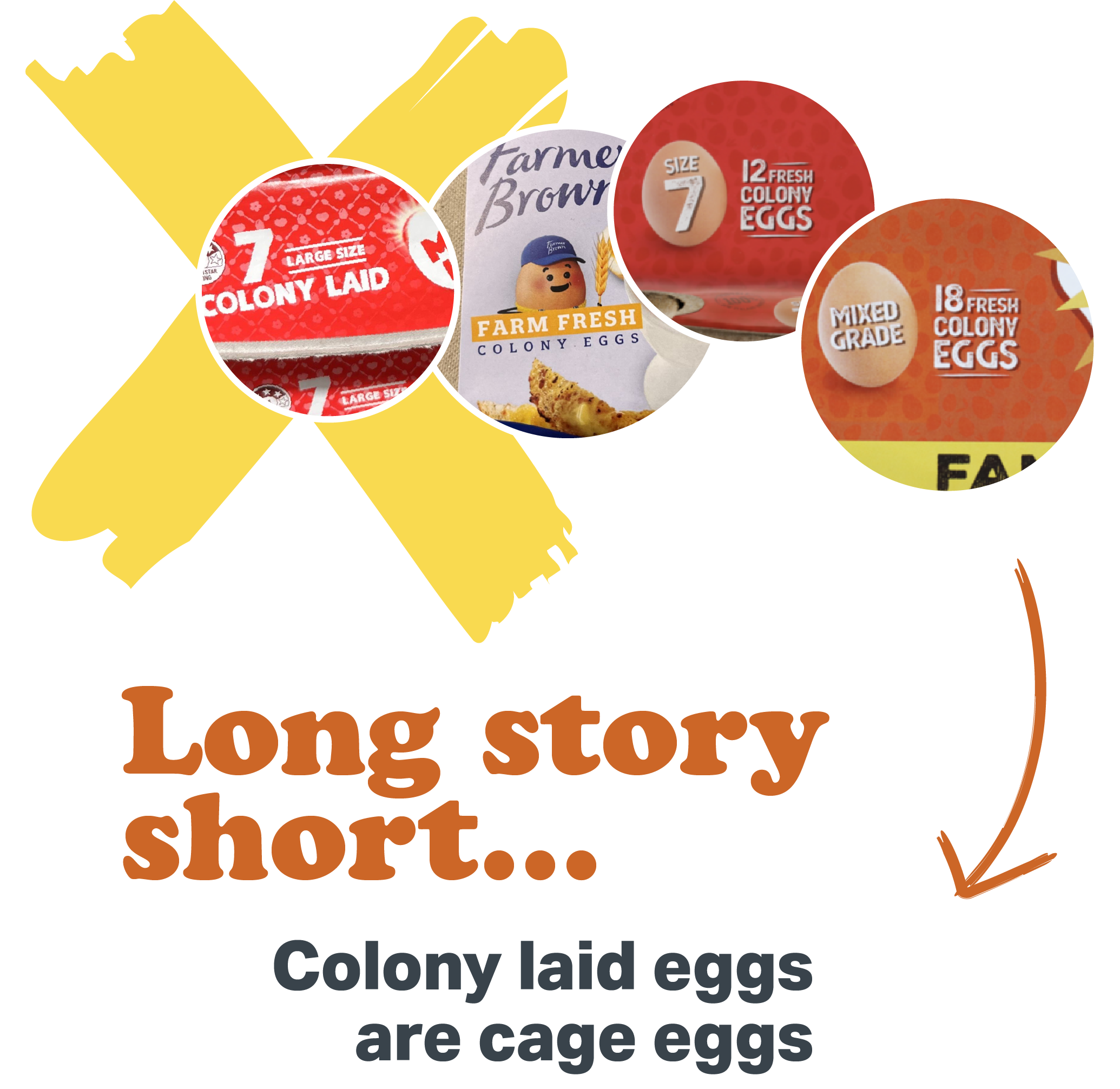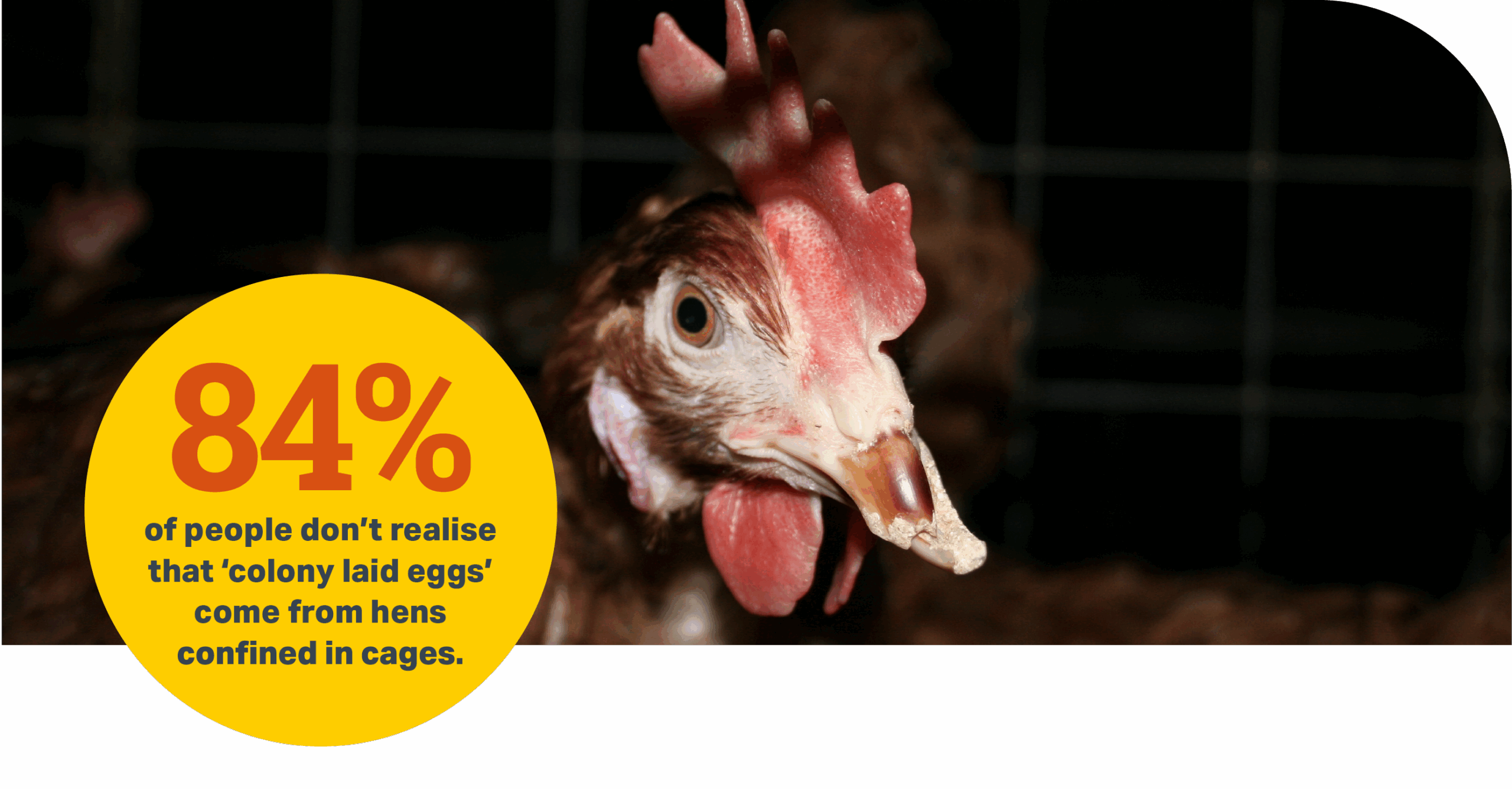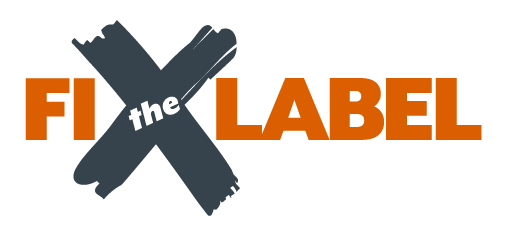Hold Aotearoa’s cage egg industry to account!
Major New Zealand egg companies are deliberately misleading Kiwis by not featuring the word “cage” anywhere on their cage egg packaging. Instead, the cruel cage egg industry uses vague and confusing labels like ‘colony’ or ‘colony laid.’

This misleading omission not only undermines consumers’ ability to make informed choices, but it also effectively erases the very real and ongoing suffering of the 1.2 million hens trapped in cages across Aotearoa.

Polling commissioned by SAFE has revealed a shocking 84% of participants did not understand ‘colony laid’ eggs are from caged hens and 72% agreed the current labelling is misleading.
Kiwis need to know that ‘colony eggs’ are cage eggs. That’s why we’ve filed a complaint with the Commerce Commission asking that it investigate the industries misleading marketing tactics and direct egg companies to put the word “cage” on all cage egg products.
Sign up for updates
We have closed our commerce complaint action on the 4th of May 2025, with 10,781 signatures!
You can still sign up to our mailing list to receive updates on our campaign, and other ways you can take action for animals.
Support our campaign
Help fund our awareness campaign to inform New Zealanders of how the egg industry is deceiving them with their labelling, and pressure the Commerce Commission to direct egg companies to fix their labels. Your donation makes this critical work possible.
Want to know more?
Is cage hen farming still legal in New Zealand?
New Zealand previously used two types of cage systems to farm hens for their eggs: ‘battery’ cages and ‘colony’ cages.
Battery cages were finally banned in New Zealand on January 1st, 2023.
Sadly, over 1.2 million hens are still farmed in ‘colony’ cages across New Zealand
Is mislabeling products illegal in New Zealand?
Under the Fair Trading Act 1986;
- No person shall, in trade, engage in conduct that is misleading or deceptive or is likely to mislead or deceive.
- No person shall, in trade, engage in conduct that is liable to mislead the public as to the nature, manufacturing process, characteristics, suitability for a purpose, or quantity of goods.
The use of the label ‘colony laid’ is in breach of the Fair Trading Act as it is misleads consumers, putting them at risk of purchasing a product that they may not understand are eggs laid by caged hens.
A 2024 Verian poll funded by SAFE found 86% of participants did not understand ‘colony laid’ eggs are produced by hens confined to cages and that 72% agreed not labelling ‘colony laid’ eggs as ‘cage eggs’ is misleading.
How does mislabeling cage eggs impact hens?
Omitting the word ‘cage’ from egg packaging isn’t just a deceptive marketing tactic aimed at consumers—it’s a deliberate attempt to obscure the harsh realities of hen farming in Aotearoa. By removing this critical descriptor, the industry risks creating the false impression that hens are no longer farmed in cages, when in fact, over 1.2 million hens are still suffering in cages across Aotearoa. This misleading omission not only undermines consumers’ ability to make informed choices, but it also effectively erases the very real and ongoing suffering of hens confined in cruel cage conditions.
Haven’t supermarkets stopped selling cage eggs?
Soon! All of New Zealand’s leading supermarkets have pledged to remove cruel cage eggs from their shelves. Woolworths (previously Countdown) will phase out the sale of cage eggs by the end of 2024 for its North Island locations and 2025 for its South Island locations. Foodstuffs (New World, Four Square and Pak’nSave) have pledged to remove cage eggs from their shelves by 2027.
What are the different egg farming methods used in New Zealand?
New Zealand has three commercial farming methods: cage, barn and free-range.
Cage (currently sold under the misleading label ‘Colony’ or ‘Colony laid’)
- Caged for life, with no access to the outdoors, fresh air, grass or sunlight.
- Up to 80 hens in one cage, each hen is allowed just 750cm2 of space each (around the size of an A4 sheet of paper).
- Beaks are partially removed.
- Killed at 18 months old.
Barn
- Farmed indoors for life, with no access to the outdoors, fresh air, grass or sunlight.
- One barn will contain thousands of hens, allowing up to seven hens per square metre.
- Overcrowded conditions, high stocking densities, and the inability to express many normal patterns of behaviour are known to cause hens to experience a range of health and welfare issues.
- Beaks are partially removed.
- Killed at 18 months old.
Free-range
- Farmed indoors in barns and allowed access to the outdoors during the daytime.
- Free-range operations may farm tens of thousands of hens in highly intensive and overcrowded conditions. High stocking densities are common practice, with up to 9 hens per square meter indoors. Outdoors, up to 2,500 hens farmed per hectare (four hens per square metre).
- Beaks are partially removed.
- Killed at 18 months old.
All commercial egg farming systems are deeply flawed and cause suffering to hens. The best thing you can do to help hens is to make the switch to plant-based egg alternatives, and the options are delicious, affordable, healthy and endless!
What are colony cages?
Colony cages are the most intensive egg farming method used in New Zealand.
One colony cage will contain up to 80 hens, where an individual bird is only given 750cm2 of space each – that’s only a little larger than an A4 sheet of paper. Hens farmed in colony cages are never allowed to leave the cages, will never breathe fresh air, the warmth of the sun or the earth under their feet. Instead, they are kept in dark sheds with thousands of other caged hens until they are killed at the age of 18 months old.
The Animal Welfare Act 1999 states animals must be allowed to express normal patterns of behaviour. Hens in colony cages are denied this legal right as they cannot engage in exploratory behaviours such as roaming, scratching and digging at the earth, dust bathing, sun basking or nest building. With so little space, colony caged hens cannot move around freely, fully stretch their wings, fly, nor can they escape from aggressive flock mates.
What’s happening overseas?
Colony cages cause so many welfare issues they have been banned around the world. The list includes US states Arizona, California, Colorado, Nevada, Massachusetts, Michigan, Ohio, Oregon, Rhode Island, Utah and Washington. South American cities Quito and Ecuador. In Europe; Austria, Belgium, Czech Republic, France, Germany, Israel, Luxembourg, the Netherlands, Poland, Iceland and Slovakia.
What is the Commerce Commission?
The Commerce Commission is a government agency responsible for administering and enforcing laws relating to competition, fair trading, consumer credit and economic regulation. They are responsible for protecting the interests of consumers and ensuring consumers can make informed purchasing choices.
The Commerce Commission has the authority to direct companies to correct their conduct if they are in breach of regulations such as the Fair Trading Act.

